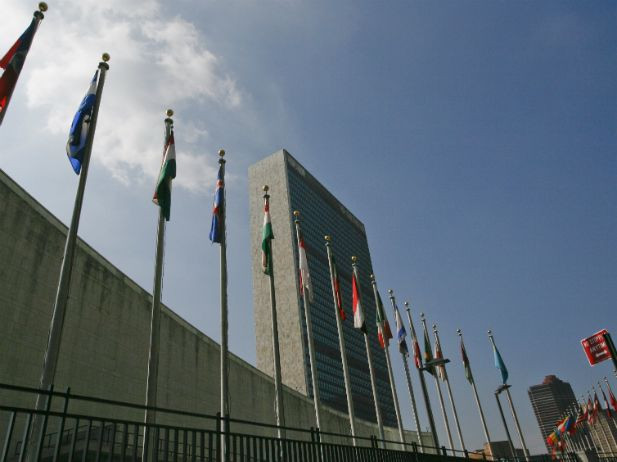Syria And Iran: The U.N. Proves Its Worth To The U.S.

WASHINGTON -- At this year’s annual meeting of the United Nations General Assembly there was less idealistic posturing and more hard work done on the most intractable of problems -- Syria’s violent civil war and Iran’s nuclear activities. The United States worked with and relied on the U.N. system to advance its interests and move towards the goal of establishing international peace.
One purpose of the U.N. Security Council is to regulate the legitimate use of force in the international arena. The willingness of the administration of US President Barack Obama to forego military action against Syria in favor of a coordinated diplomatic solution to rid the nation of its deadly stockpile of chemical weapons validates the role of the Security Council, as envisioned by its founders more than 65 years ago.
In both Syria and Iran, other parts of the U.N. system have also been mobilized and are playing important roles in managing, rather than preventing, conflict.
The U.N. is playing both humanitarian and political roles in Syria, where more than 100,000 people have been killed in fighting and millions have fled their homes. The major U.N. agencies are implementing programs to provide food, shelter and health care for internally displaced people in Syria as well as Syrian refugees in the neighboring countries of Turkey, Lebanon and Jordan.
Leaders of these U.N. agencies came to Washington over the summer to coordinate with their partners at the State Department and U.S. Agency for International Development, to try to persuade members of U.S. Congress to appreciate and support their work. There is no doubt that the U.S. has been the largest contributor to the diverse -- and sadly insufficient -- efforts to assuage the terrible suffering of the Syrian people, working quietly and letting the U.N. take the lead role.
On the political front, the process to attempt a negotiated replacement of President Bashar Assad as Syria’s leader is now back in play – despite the U.N.’s past inability to persuade the factions in Syria to engage. The U.N.-led peace process stalled soon after it was established more than a year ago, as the civil war intensified and forces opposing Assad made clear they were not interested in a negotiated settlement.
By de-legitimizing the Assad regime and calling for its ouster, America and other nations undermined the U.N. peace process – intentionally or not. Now there is renewed interest in seeing whether the U.S. and Russia, working with the U.N., can persuade the parties to stop the slaughter and work for a less-than-ideal outcome for all that would at least curb the violence and prevent the complete collapse of the Syrian state. U.N. mediators will need strong support from the key members of the Security Council to make such progress.
With respect to Iran, the U.N. structure has been in place for years, waiting for a push from both Tehran and Washington. The election in June of President Hassan Rouhani provided the opportunity for Obama to renew his pledge to engage Iran with an open hand, not a clenched fist. The new mood and momentum was palpable in New York at the end of September.
Now the International Atomic Energy Agency (IAEA), which reports to both the Security Council and the General Assembly, has a challenging assignment. The agency will be supporting the efforts by the five permanent members of the Security Council plus Germany to negotiate an agreement that prevents Iran from getting nuclear weapons, while still developing nuclear power for peaceful purposes.
The IAEA will have to carry out additional monitoring and inspections of Iran’s nuclear facilities to ensure Iranian compliance with any agreement that is reached in order to give the international community information it needs to justify the lifting of crippling economic sanctions against Iran.
The U.N. has its limitations – sometimes caused by its own bureaucratic culture of caution and sometimes caused by the lack of strong consensus among member states that direct the world body and often lead to funding shortfalls for approved activities.
For example, the U.N. has been criticized for not pushing the Syrian government hard enough for access to vulnerable populations. However, the U.N. took a public stand Oct. 2 calling for unhindered access to Syrians in need.
On Iran, the U.N. depends entirely on the will of the five permanent members (the U.S., Russia, China, France and Britain) to set the agenda and to respond to the ups and downs of Iran’s behavior on nuclear issues
America always has the option of going it alone in taking military action, and there is indisputably a part of the U.S. electorate that prefers that approach. The sheer capacity of the United States military dwarfs any invocation of collective security rights and responsibilities of the U.N. The U.S. willingness to use force to protect its interests, or even to defend the global commons, creates friction between Washington and the U.N.
The asymmetry of power and the different political cultures can generate centrifugal force. In the case of Iran, no one doubts that a more normal relationship with Washington is the real prize. Iran’s desire to be accepted as a regional power in the Middle East will be addressed in a bilateral channel, and then perhaps validated at the multinational level.
These challenges notwithstanding, the U.S. and U.N. demonstrated good teamwork in recent weeks to fulfill the U.N.’s objective of resolving international disputes diplomatically rather than militarily.
Ellen Laipson is president and CEO of the Stimson Center, a nonprofit and nonpartisan international security think tank. She served as a member of the U.S. mission to the U.N. from 1995-97.
© Copyright IBTimes 2024. All rights reserved.











